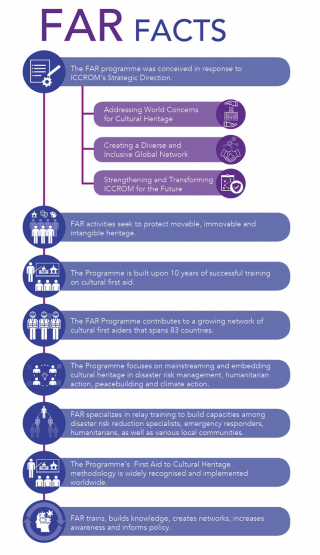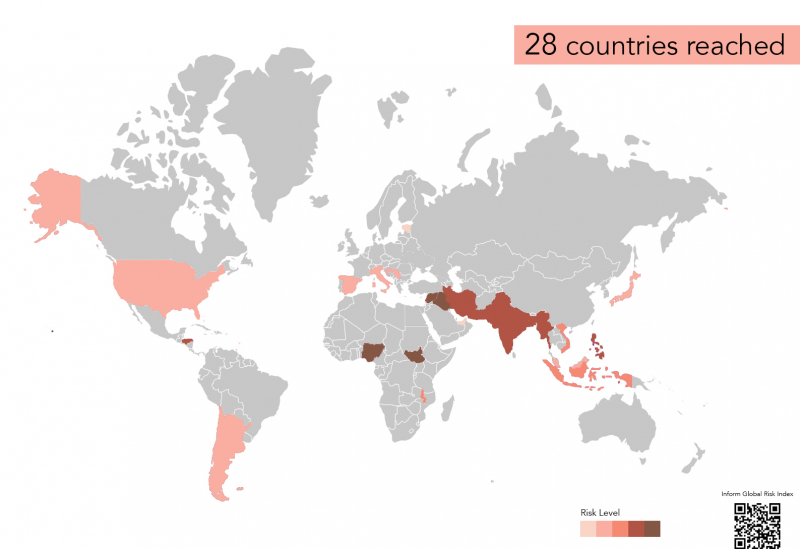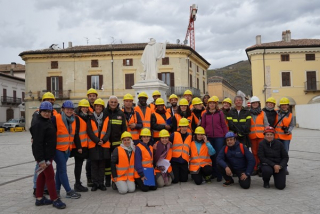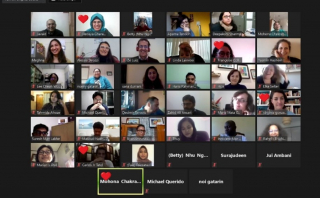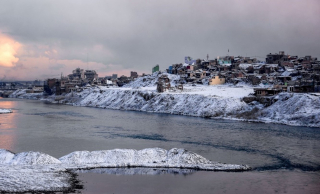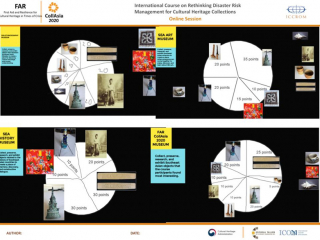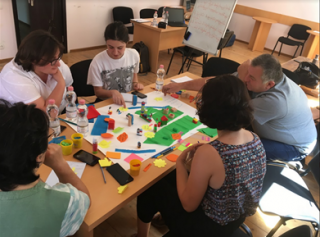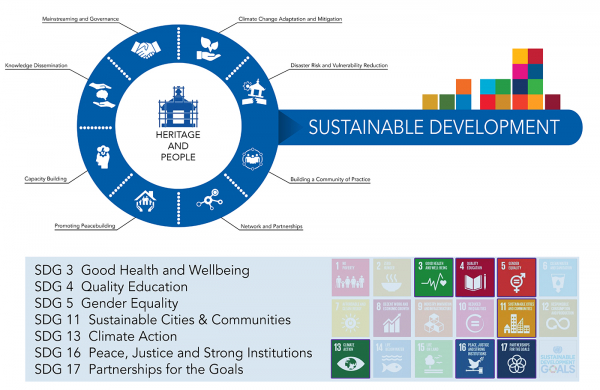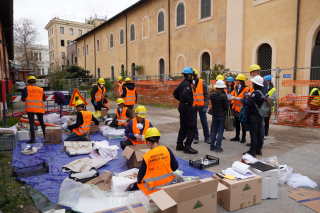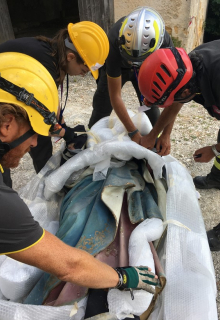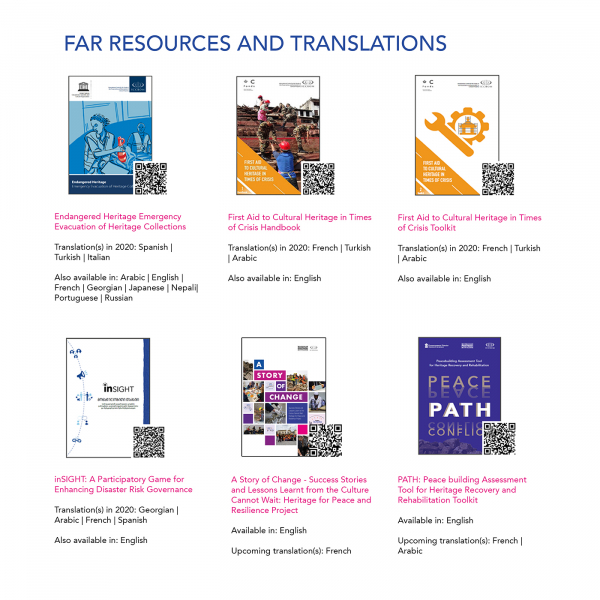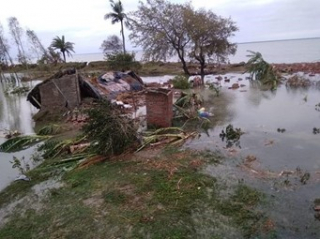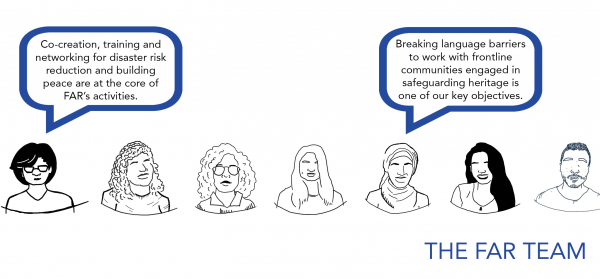Click to enlarge
First Aid and Resilience for Cultural Heritage in Times of Crisis (FAR) in 2020
Dominated by COVID -19 pandemic, the year 2020, marked the genesis of FAR – First Aid and Resilience in Times of Crisis – an ICCROM flagship programme that aims to safeguard heritage, associated communities and reduce the risks of disasters and conflicts.
The Programme motto, Culture Cannot Wait, is grounded in the belief that by integrating heritage safeguard into the wider programmes for Disaster Risk Reduction (DRR), Humanitarian Aid, Peacebuilding and Climate Action, we can build peaceful and disaster-resilient communities.
In its first year, the Programme served 26 Member States and 2 non-member states through cascading capacity building projects, promoting community-based disaster risk management and offering advisory services for protecting cultural heritage before, during and after a disaster or a conflict.
Countries reached: Argentina, Bangladesh, Barbados, Chile, Croatia, Estonia, Honduras, India, Indonesia, Iran, Iraq, Italy, Japan, Lebanon, Malawi, Malaysia, Myanmar, Nepal, Nigeria, Pakistan, Philippines, Serbia, South Sudan, Spain, Syria, United Arab Emirates, United States of America, and Viet Nam.
Click to enlarge
2020 Highlights
Our story of change: building a community of practice
Strengthening its growing network, the FAR Programme co-developed and provided mentoring support for 16 innovative field projects in 14 hazard-prone countries, training a total of 345 professionals and mobilizing over 70 diverse organizations over a period of 9 months, involving multiple actors and relevant stakeholders, as well as local communities. The overall aim was to enhance disaster resilience and contribute to peacebuilding in regions affected by cyclic disasters and conflicts. The field projects were conceived as part of a multi-partner capacity development project, Culture Cannot Wait: Heritage for Peace and Resilience. For inspiring stories of change from Iraq, South Sudan, Estonia, Japan, and more, read A Story of Change – Success Stories and Lessons Learnt from the Culture Cannot Wait: Heritage for Peace and Resilience Project.
Click to enlarge
Dealing with the unthinkable risk- our COVID response
The unforeseen risk of COVID -19 knew no borders. Yet, it provided us with the space to pause and reflect on the role of heritage in coping with crises and sustaining social growth.
Finding an opportunity in this challenge, as well as addressing gaps in information and knowledge, the FAR programme populated ICCROM’s web platform, Heritage in Times of COVID, with tools and tips for managing risks to cultural institutions, adapting to the new reality of the pandemic and saving livelihoods in times of crisis. A series of eight webinars were organized that leveraged FAR’s alumni network and provided an opportunity to share experiences and good practices to facilitate recovery.
Moreover, with the aim of multiplying efforts of documentation, the FAR Programme produced risk and impact assessment forms for movable, immovable and intangible heritage in seven languages along with its corresponding guidance.
War, Pandemics and Disasters – FAR Action in MENAP Region
Confronted by intersecting conflicts, disasters and epidemics, cultural heritage and its bearers are most vulnerable in the Middle East, North Africa, Afghanistan and Pakistan (MENAP) regions.
In collaboration with Alliance for Cultural Heritage First Aid, Peace and Resilience, the FAR programme, through its blended learning technique of co-creation to mentorship and broader application through context-specific field projects, created a unique cascading capacity development initiative. Involving four mentors, this project will train over 20 professionals from diverse backgrounds, addressing all types of risks threatening heritage and associated communities in fragile settings, over a period of 23 months.
As part of this initiative, a series of self-help learning tools are being created in Arabic, with English subtitles. These videos provide easy-to-follow guidance to protect cultural heritage during the crisis of COVID-19 and safeguard cultural heritage and support livelihoods in crisis.
Click to enlarge
Multi-Hazard Disaster Risk Management for Collections in Southeast Asia and beyond
Combining simulation-based instruction with online training and distance mentoring, the FAR programme joined efforts with the CollAsia programme to offer a pioneering course. The training promoted multi-hazard disaster risk management in Southeast and South Asia, regions greatly by climate change and hydrometeorological hazard events, by mobilizing 20 professionals from 14 risk-prone countries in the region and beyond.
Meeting the SDGs
In order to create a better understanding of how heritage enables sustainable development, FAR undertook targeted field research involving its network of alumni. Results of the research are now available for wider use in form of two tools: inSIGHT and PATH.
InSIGHT is a participatory community-based game that helps to assess heritage-related capacities and vulnerabilities, which in turn help improve local disaster risk governance and contribute to climate action. Playing inSIGHT will help heritage institutions and local governments to comply with Sustainable Development Goals 11 and 13 by recognizing the traditional knowledge and practices of a community that contribute to the sustainable management of natural resources in a given context.
PATH – Peacebuilding Assessment Tool for Heritage Recovery and Rehabilitation aims to make interventions for heritage recovery more conflict-sensitive. The tool helps heritage practitioners, peacebuilders and supporting heritage and aid organizations in diverse conflict contexts to enable the use of post-crisis heritage recovery and help build peaceful and just societies – a global priority as outlined by the Sustainable Development Goal 16.
SDGs that FAR is pursuing
Click to enlarge
Mainstreaming Disaster Risk Management for Cultural Heritage
Working with mainstream disaster management and humanitarian aid agencies to assist frontline communities in safeguarding their heritage is a key programmatic orientation of FAR.
In February 2020, the FAR Programme assisted the Indian Ministry of Home Affairs and National Disaster Response Force to test the emergency procedures for early warning, preparedness and emergency response in the event of complex emergencies. National rescue teams of five countries – India, Bangladesh, Nepal, Sri Lanka & Myanmar – of the Bengal Initiative for Multi-Sectoral Technical and Economic (BIMSTEC) group, participated in this training for the 2nd BIMSTEC Disaster Management Exercise, conducted at the Ramachandi Beach, Puri, Odisha, India.
Funded by the European Commission Directorate-General for European Civil Protection and Humanitarian Aid Operations (DG ECHO), Proculther-Protecting Cultural Heritage from the Consequences of Disasters, a first in its kind multi-partner initiative, aimed to develop a common methodology for emergency preparedness and response for cultural heritage and embed it into national civil protection response systems. The FAR programme is assisting in the development of the training component of this project.
In collaboration with UNESCO and the United Nations Office for the Coordination of Humanitarian Affairs (UNOCHA), the FAR Programme is contributing to the ongoing guideline development of the International Search and Rescue Advisory Group (INSARAG) for conducting search and rescue operations at heritage sites.
Breaking Language Barriers
Access to knowledge and information is crucial for disaster-resilient communities, and language can be a significant barrier. Breaking such barriers, FAR together with institutions in ICCROM’s Member States is translating Tools and self-help guides into a variety languages.
Click to enlarge
Assisting Member States in Times of Crisis
This past year has seen some of the worst disasters, which disrupted communities and everyday lives worldwide. Upon receiving specific requests from the national institutions of the affected Member States, the FAR programme leveraged its network of cultural first aiders to mount efficient responses.
A Rapid Needs Assessment report for NGOs and the National Disaster Response Force in India informed response and relief efforts in the immediate aftermath of extensive damage caused to the World Heritage Site and nature reserve in Sundarbans due to Super Cyclone Amphan in June 2020.
Additionally, online training sessions were organized to provide first aid to damaged heritage collections and buildings in Zagreb, Croatia after the earthquake in March 2020, and in Lebanon after the explosion in August 2020.
Acknowledging the invaluable support of our resource partners: ALIPH Foundation; Cultural Heritage Administration of the Republic of Korea; Principality of Monaco and Swedish Postcode.
With the support and input of our co-creators and project collaborators: Archaeological Survey of India (ASI); Blue Shield Germany; Bay of Bengal Initiative for Multi-Sectoral Technical and Economic Cooperation (BIMSTEC); Carabinieri; Caribbean Branch of the International Council on Archives (CARBICA); Centre for Security Studies, Zurich (CSS); CRATerre; Corpo Nazionale dei Vigili del Fuoco (CNVVF); Confederation of Risk Reduction Professionals; Directorate General of Antiquities of Lebanon (DGA); Egyptian Heritage Rescue Foundation (EHRF); Escuela Taller de Filipinas Foundation; Estonian National Heritage Board; Georgian National Committee for the Blue Shield; Georgia Red Cross Society; Gilgamesh Center for Antiquities and Heritage Protection; Grupo de Amigos do Museu Nacional dos Coches (GAMNAC); Honduran Institute of Anthropology and History (IHAH); International Council of Museums (ICOM); ICOM Italy; International Council on Monuments and Sites (ICOMOS) India; ICOMOS Portugal; ICORP Turkey; Indian National Trust for Art and Cultural Heritage (INTACH); Indian Ministry of Home Affairs (MHA); International Search and Rescue Advisory Group (INSARAG); Italian Civil Protection; Italian Red Cross; Junta de Castilla y León, Consejería de Cultura y Turismo, Dirección General de Patrimonio Cultural; the Ministry for Culture and Heritage, New Zealand; Ministry of Interior – Disaster and Emergency Management Authority (AFAD – Turkey); Ministère de l’Intérieur – Direction générale de la Sécurité Civile et de la Gestion des crises (DGSCGC – France); the Ministry of Interior, United Arab Emirates; National Disaster Response Force (NDRF); National Parks of New York Harbor; Presidency of the Council of Ministers – Italian Civil; Protection Department (DPC – Italy); Save the Children, India; School of Civil and Building Engineering; Servicio Nacional del Patrimonio Cultural; Sharjah Police; Smithsonian Cultural Rescue Initiative; South Sudan National Archives (SSNA); Soprintendenza Archeologia Belle Arti e Paesaggio delle Marche; Swedish National Heritage Board; the Tokyo National Research Institute for Cultural Properties; Villa Montesca – Fondazione Hallgarten – Franchetti Centro Studi Villa Montesca (Italy); Ufficio Speciale Ricostruzione – Umbria (USR – Umbria); United Nations Development Programme (UNDP); UNESCO; UNICEF Syria CO. and University of Loughborough, United Kingdom.
#culturecannotwait
Anthony Rizk, Intern – FAR Programme, ICCROM
Jui Ambani, Consultant – FAR Programme, ICCROM

